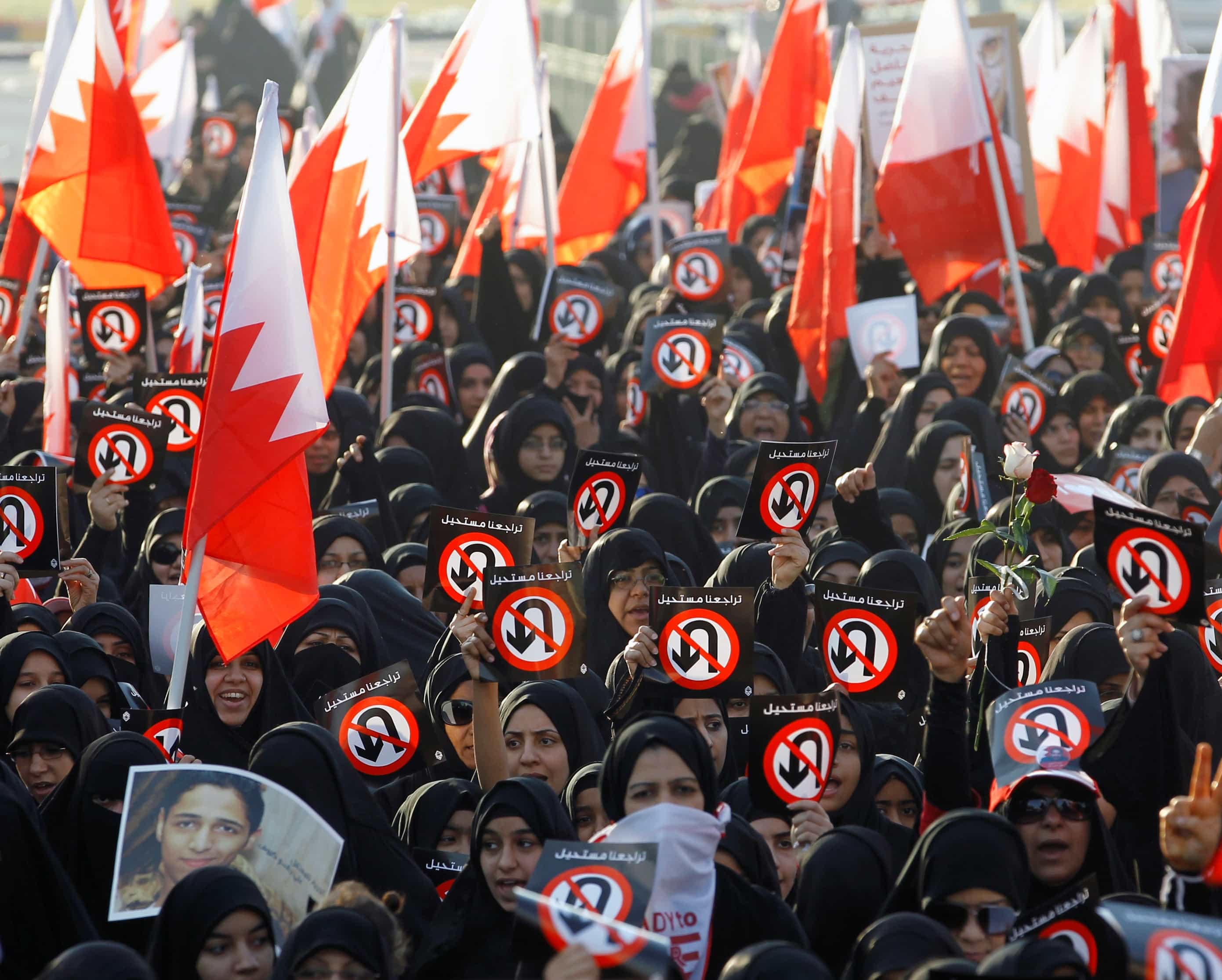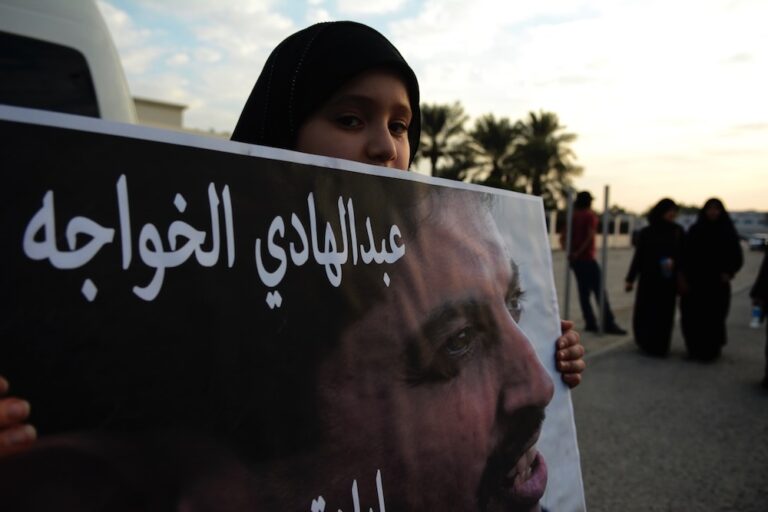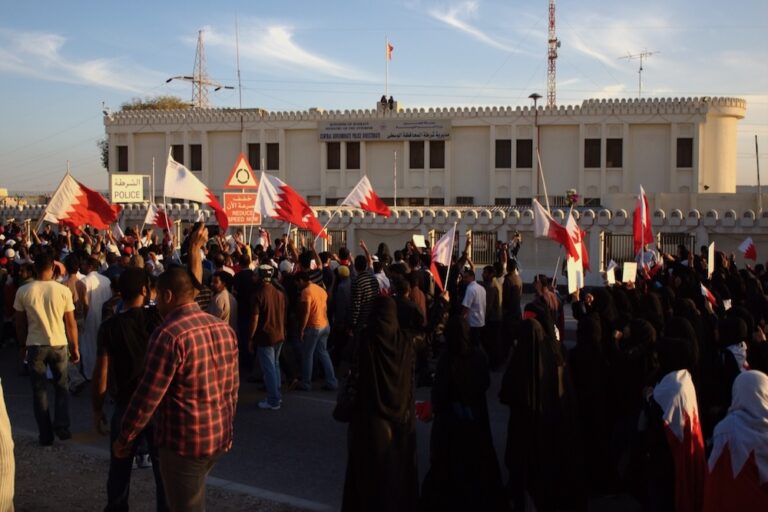As local and international rights organisations held events and activities surrounding the second anniversary of Bahrain's pro-democracy uprising, protests across the country were met with violence from the authorities resulting in the death of a teenage boy.
UPDATE: Bahraini citizen Amina Said Abdullah died as a result of tear gas bombs fired by the authorities on 13 February 2013. Security forces used excessive force when dealing with peaceful protesters demonstrating at Abdullah’s funeral on 16 February. (ANHRI, 19 February 2013)
(IFEX) – The second anniversary of the Bahraini pro-democracy uprising has already been marked by tragedy, as 16-year-old Hussain Al-Jaziri was shot dead during protests in a village west of the capital, Manama early on 14 February 2013.
There is not much to celebrate on this anniversary. In a publication released to coincide with the second anniversary of the uprising, the Bahrain Centre for Human Rights (BCHR) reports that 87 people have been killed by the Bahraini security forces since February 2011. Tear gas has been the number one cause of death, making up 39 per cent of the deaths recorded and documented by BCHR. Direct shootings, as in the case of Al-Jaziri, have been the second most common cause of death, comprising 31 per cent of the total.
In advance of the anniversary, people have been protesting across the country, and riot police have responded with tear gas and birdshot. Opposition groups have called for a general strike on 14 and 15 February.
Two years ago, protests erupted in Bahrain amidst a wave of popular uprisings demanding the overthrow of oppressive regimes in countries throughout the Middle East. Bahrainis added their voices to the calls for change, demanding democratic reforms and an end to the monarchy’s violations of the rights of its citizens. But in March 2011, the demonstrations were crushed by the Bahraini government. Security forces were sent in to clear the iconic site of the Pearl Roundabout in Manama, where thousands of protesters had set up camp.
Two years of civil unrest and cosmetic governmental changes have followed. BCHR, a member of IFEX and the most vocal independent human rights organisation in Bahrain, has been particularly targeted by the regime. Three representatives of BCHR, including founder Abdulhadi Al-Khawaja, current president Nabeel Rajab, and acting vice president Said Yousif Al-Muhafda, are currently serving jail terms on what can only be described as politically motivated charges.
“On the second anniversary of the Bahrain uprising, it appears that Bahraini authorities are not satisfied with merely shutting down the voices of dissent — they seem intent on weakening or paralysing local human rights organisations like IFEX member BCHR,” said IFEX Executive Director Annie Game.
On 2 February 2013, Al-Khawaja went on a hunger strike to protest the prison administration’s restrictions on communication and its refusal to respond to his and his fellow activists’ legitimate demands. AbdulHadi Al-Mukhoder and AbdulJalil Al-Singace, two of 13 opposition figures charged with ‘plotting to overthrow Bahrain’s ruling family’ in the 2011 uprising, joined the strike a few days later. The two have been denied access to a lawyer since their final appeal was rejected by the Court of Cassation on 7 January 2013, and concerns remain for their health and well-being.
Unlike other countries that formed part of the Arab Spring, events within Bahrain have been largely disregarded by international media. Nevertheless, individuals, organisations and human rights groups inside and outside of Bahrain have kept up the pressure and have been preparing for the anniversary:
- A number of rights groups and NGOs in Bahrain, including BCHR, have come together under one umbrella, to create the Bahrain Human Rights Network (BHRN). In its mission statement, BHRN has declared that the network will work with a common vision — to highlight human rights violations in Bahrain.
- IFEX member Freedom House organised “Two Years Later – Prospects for Reform in Bahrain on the Anniversary of the Uprising”, a panel discussion to examine the underlying reasons for the lack of progress and assess the prospects for real political reform in Bahrain.
- Bahrain Human Rights Defenders (BHRD) in Denmark is commemorating the anniversary at city hall in Copenhagen with a photo exhibition chronicling events from 14 February 2011 to the present.
- A petition was launched on 6 February 2013 by IFEX, calling on the King of Bahrain to free all human rights defenders, journalists and bloggers languishing in jail for exercising their right to free expression.
To help keep track of all the events and news surrounding human rights campaigning for Bahrain on or around 14 February, the International League for Human Rights (FIDH), in cooperation with IFEX, has created Freedom in Bahrain — a website to mark the international day for human rights in Bahrain.
While the door for dialogue was reopened by Bahrain’s King in January 2013, and talks between opposition groups and the government began last week, many activists are skeptical. Maryam Alkhawaja, the acting president of BCHR, expressed her concerns to Index on Censorship that the dialogue may be used as a public relations tactic.
“Even in the face of such brutal repression from the government, there is still reason to hope,” she wrote in a letter included in BCHR’s report, “I recently traveled to Bahrain for the first time in more than a year and a half, and was deeply moved by the peaceful resilience that I witnessed in activists and ordinary citizens across the country.”



